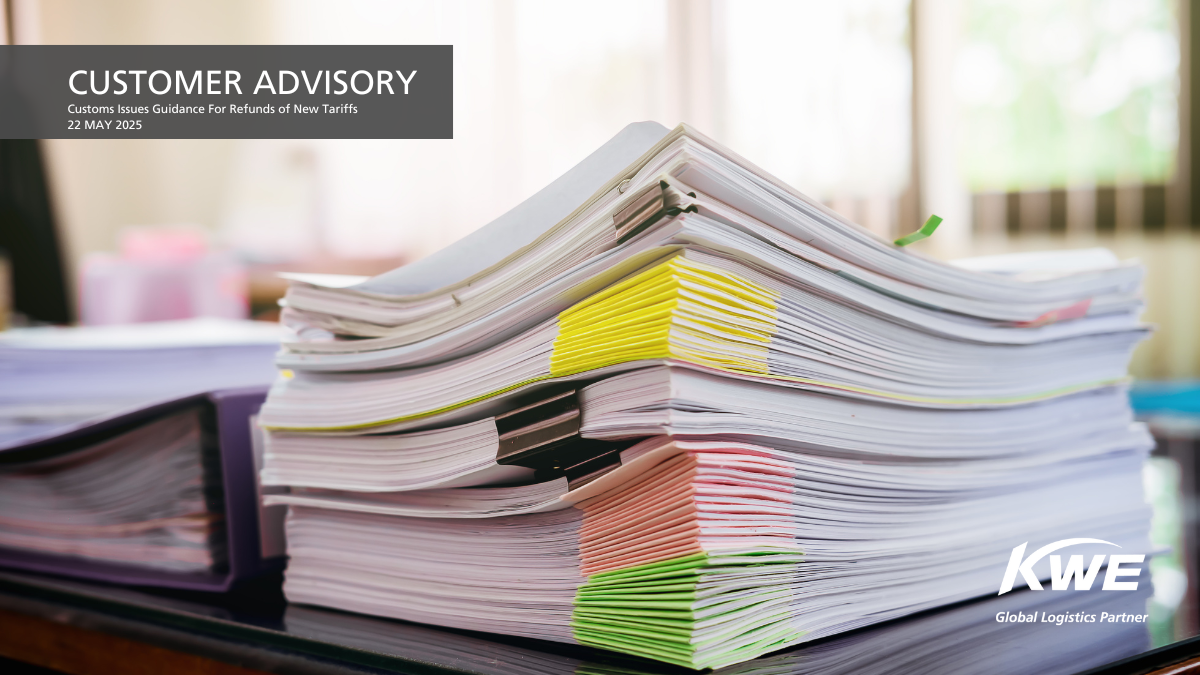Quote
Customer Advisory: Customs Issues Guidance For Refunds of New Tariffs

While the tariff “stacking” Executive Order provided that it would apply retroactively to entries on or after March 4, 2025, and that importers could request refunds for eligible entries, U.S. Customs and Border Protection (CBP) previously instructed importers to await further guidance before requesting refunds. That further guidance has now been issued, and refund requests may be submitted by filing a Post Summary Correction (PSC) for unliquidated entries or a protest under Title 19 of the United States Code, Section 1514 (19 U.S.C. §1514) for entries that have liquidated but where the protest period has not expired.
If you are unsure about which tariffs apply, consult with licensed customs brokers or trade compliance experts for guidance. Also, Free Trade Agreements (FTAs) may offer duty-free treatment for certain goods, potentially offsetting some of the stacking effect. Additionally, keep yourself updated and informed of any changes to Harmonized Tariff Schedule (HTS) codes, tariff rates, or trade regulations.
Cargo Systems Messaging Service (CSMS) #65054270 issued by U.S. Customs and Border Protection (CBP) provides updated guidance following Executive Order 14289 addressing certain tariffs on imported articles. As explained, these tariffs should not all have a cumulative effect (or “stack” on top of one another) because the rate of duty resulting from such stacking exceeds what is necessary to achieve the intended policy goals.
As explained in Section 5 of the referenced Executive Order:
“The Secretary of Homeland Security, acting through the Commissioner of U.S. Customs and Border Protection (CBP) and in consultation with the Secretary of the Treasury, shall take all necessary steps to update guidance, systems, and enforcement mechanisms, including to revise, suspend, or rescind any regulations that may be inconsistent with this order, to reflect the policy set forth in this order.”
“Tariff stacking” refers to multiple tariffs being applied to a single imported good, effectively increasing the overall cost. This can occur when a Harmonized Tariff Schedule (HTS) code specifies a base duty, which is then further burdened by other duties like anti-dumping and countervailing duties (AD/CVDs) or tariffs imposed under Section 301 of the Trade Act of 1974 or Section 232 of the Trade Expansion Act of 1962. For example, a product with a base HTS code duty of 5% could be subject to additional tariffs under Section 301 or Section 232, resulting in a cumulative tariff rate higher than 5%.
The referenced order aimed to address tariff stacking by creating a hierarchy of tariffs, generally applying only one of several potential tariff regimes to a product. There could still be exceptions, such as derivative articles of steel and aluminum, which may still incur both Section 232 steel and aluminum tariffs if covered by both regimes. For further details, refer to the Federal Register Notice issued by U.S. Customs and Border Protection (CBP) on May 20, 2025.
Of the five tariff regimes addressed (Section 232 autos, steel, aluminum, and International Emergency Economic Powers Act (IEEPA) Canada/Mexico), a given product would generally only be subject to one. The exceptions are derivative articles of steel and aluminum, which incur both Section 232 steel and Section 232 aluminum tariffs if the article is otherwise covered by both regimes.
National Commodity Specialist Division (NCSD) Upcoming 2025 Webinars
The NCSD intends to focus this year on Balancing Fair Trade, providing guidance to move forward in support of validation and enforcement protocols and facilitate legitimate trade. Each webinar will commence at 1:30 p.m. Eastern Time and run for about an hour. Upcoming webinar links are provided below:
- Decorative Articles of Ceramics of Heading 6913 – Thurs., May 22, 2025
- Measuring and Checking Instruments of Heading 9031 – Tues., Jun. 3, 2025
- Telecommunication Devices of Heading 8517 – Wed., Jun. 4, 2025
- An Overview of Welding Machines and Apparatus – Thurs., Jun. 5, 2025
- Shoe Shank Redemption – Tues., Jun. 10, 2025
- "Handy” Glove Classification Information – Wed., Jun. 11, 2025
- Overview of Hand Tools Classified in Chapter 82 – Tues., Jun. 24, 2025
- Fair Trade Fabrics – Wed., Jun. 25, 2025
Informational document brought to you by Kintetsu World Express (KWE) USA Corporate Compliance